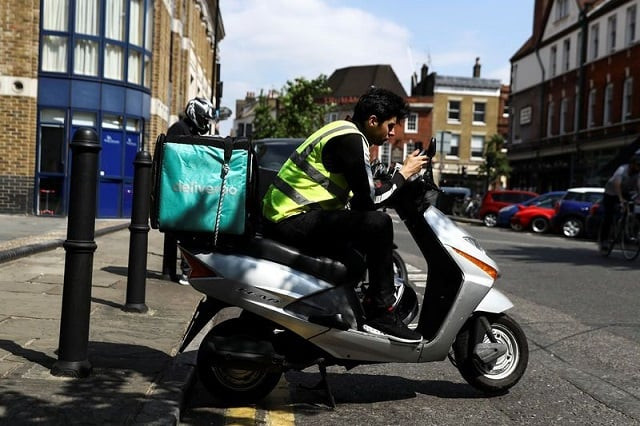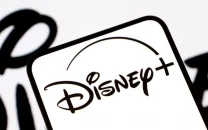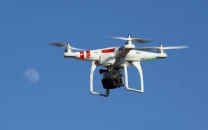Amazon squares up to Uber with backing for UK food app Deliveroo
In the global race to dominate the market for takeaway meals

A Deliveroo scooter driver takes a break between deliveries in London, Britain June 8, 2018.
PHOTO: REUTERS
The news the world’s biggest online retailer had bought into one of Europe’s fastest growing tech companies sent shockwaves through the sector, hitting shares in European rivals Just Eat, Takeaway.com and Delivery Hero.
The online giants are betting the takeaway market will expand as it branches out from fast, unhealthy meals to nutritious dishes and that they have the scale to beat smaller rivals which are still largely sacrificing profits to grow.
Amazon scraps secret AI recruiting tool that showed bias against women
Deliveroo founder and CEO Will Shu said the fundraising would enable the loss-making group to increase its reach, develop technology and pursue innovations such as expanding its own kitchens that can be rented to restaurants to meet demand.
Deliveroo did not give a figure for Amazon’s contribution. It has now raised $1.53 billion to date, helped by existing investors T. Rowe Price, Fidelity Management and Research Co, and Greenoaks.
Shu said: “Amazon has been an inspiration to me personally and to the company, and we look forward to working with such a customer-obsessed organization.”
The former Morgan Stanley banker launched Deliveroo after moving to London from the United States and finding a lack of delivery options when working late. He says he still delivers meals once a week to understand the job of the rider.
Headquartered in London, Deliveroo uses 60,000 riders dressed in black and teal jackets to deliver meals from more than 80,000 restaurants and takeaway outlets in 14 countries including France, Germany, Hong Kong, Singapore and Kuwait.
Its “Frank” algorithm links the restaurants and riders with the customer, based on location, to cut the time of delivery.
Deliveroo competes with Uber Eats, present in North America, South America, Europe, Asia and Africa, and part of the ride-hailing giant that has a market valuation of $72 billion after its recent flotation.
It also competes with the loss-making Takeaway.com platform which is in 10 European countries and Israel, and Germany’s Delivery Hero. Operating in more than 40 markets with more than 290,000 restaurant partners, it hopes to break even in Europe in the second half of this year.
Showing the fight underway in each market, Takeaway.com and Delivery Hero recently settled a costly struggle for supremacy in Germany, with Takeaway agreeing to buy its larger rival’s businesses there for almost 1 billion euros ($1.1 billion).
In Britain, Deliveroo is locked in a battle with Uber Eats and the online platform Just Eat, and its riders are a common sight carrying delivery boxes emblazoned with its kangaroo logo.
Just Eat, which originally connected customers with local takeaway restaurants that provided their own delivery service, has grown rapidly since it launched in 2001 and listed in 2014.
But it has spooked investors this year with its need to constantly ramp up spending to meet demand. Just Eat had a market valuation of 4.6 billion pounds ($5.9 billion) prior to Friday, when its shares fell 10 per cent in early trading.
Just Eat investor Cat Rock Capital said it was surprised Amazon had decided to partner with “cash-burning” Deliveroo, but that the deal showed the strategic interest in the sector and should spur the Just Eat board to find its own partner.
“We are confident that Just Eat’s significant strategic value will be unlocked if the Board engages with the many potential strategic partners available to the Company.”
Other challenges facing the sector include the push by riders to have workers’ rights, an issue that is facing all parts of the gig economy, where people work for multiple employers without fixed contracts.
Amazon launches in Turkey
Analysts said Amazon’s firepower and distribution capabilities could have a huge impact on the market and suggested the US group might take over Deliveroo completely.
“Amazon is known for its tolerance for losses, and its willingness to price-gouge in search of market share,” Laith Khalaf, senior analyst at Hargreaves Lansdown, said.
Doug Gurr, Amazon UK country manager, said Deliveroo was an innovative company and the US group was excited to see what it did next.
Amazon currently sells food in Britain through its Amazon Fresh, Amazon Pantry and Amazon Prime Now services and has a wholesale deal with supermarket Morrisons. But, according to market researchers Kantar Worldpanel, its UK grocery market share is still less than 1 per cent.
It has previously tried and failed to run a restaurant delivery service in Britain.



















COMMENTS
Comments are moderated and generally will be posted if they are on-topic and not abusive.
For more information, please see our Comments FAQ